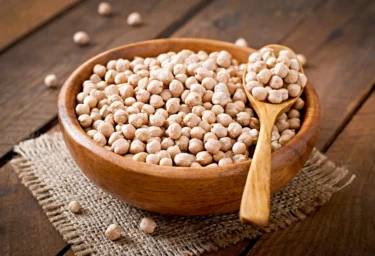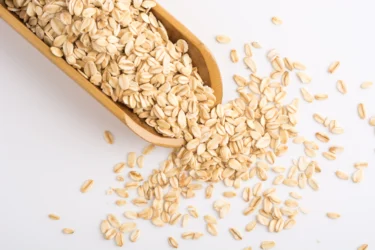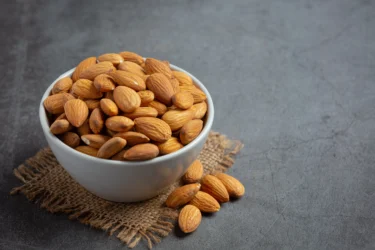The thyroid gland helps to regulate the metabolic processes of the body. It produces thyroid hormones that regulate many biological functions and ensure proper health is maintained. When the thyroid gland becomes sluggish or overactive, it can lead to many problems1.
A healthy diet may help optimize thyroid gland function at times. Many components in our daily diet can help our thyroid gland stay balanced or achieve a state of equilibrium if it is not functioning correctly.
Before we take a look at the best foods to consume in order to fight thyroid disorders, it will be best to bust some common myths surrounding thyroid diet:
Did you know?
These vegetables include those like broccoli, cauliflower and kale, and they might interfere with how your thyroid gland uses iodine as it plays a role in hormone production inside the thyroid gland. The truth is that you should eat these veggies as they are a part of a healthy diet. Those having a tendency to form goitre should restrict their intake as suggested by their treating physician or Endocrinologist.
There’s no need to take these supplements if you are living in a country where other items have iodine in them, like table salt.
This is a misconception, as a gluten-free diet cannot help or cure Hashimoto’s thyroiditis in any way. Those individuals with certain medical conditions might derive benefits from such a diet
Did you know that beauty products can affect thyroid health? It is believed that plasticizers found in cosmetic products might affect the regulation of thyroid hormones and alter hormone levels2.
Dr. Smita Barode, B.A.M.S, M.S.
A weight gain of 5 to 7 pounds may be linked to an underactive thyroid, but beyond this, the thyroid has nothing to do with a significant weight gain.
Like everyone else, it is important to have a healthy and balanced diet. Diet alone cannot cause or cure thyroid-related problems.
Researchers say Goitre and/or hypothyroidism may occur as a result of eating soybeans, cauliflower, or cabbage. These are believed to be goitrogenic foods.
Dr. Rajeev Singh, BAMS

Dairy products, mainly yoghurt, are very nutritious and help to provide iodine to some extent. Iodine is needed for the optimal functioning of the thyroid gland3.

Apples, pears, plums and citrus fruits are abundant with pectins15, which might help with detoxifying the body of mercury4. It is postulated that mercury exposure from seafood might at times contribute to the disruption of thyroid gland function5.

Pumpkin seeds, sunflower seeds and nuts are rich sources of zinc6. Low levels of Zinc have been associated with thyroid problems7. Add to the salads or munch on these as snacks to replenish your body with zinc.

Beans and legumes are rich, not just in Zinc but fibre as well. These help to regulate the digestive system, especially bowel movement and prevent constipation8.

Hail the Orient. Green tea is known all over the world as an aid to boost metabolism. Green tea has catechins, a kind of antioxidant that might prompt fat cells to release the fat and help the liver burn off the excess fat9.
Also Read: 17 Protein-Rich Foods For a Healthy Life

The body uses up more energy to digest whole grains. The metabolism might increase with the extra fibre as the body has to work harder to break down the whole grains. Try to eat oats, brown rice, sprouts, sprouted grain bread and quinoa as a part of a healthy diet routine.
Just like Zinc, Selenium is believed to be another micronutrient that is essential for healthy thyroid functioning. Selenium is present in food items such as eggs, fish, meat, cereals and nuts10.
Dr. Siddharth Gupta, B.A.M.S, M.D (Ayu)

Avocados are almost the wonder food of modern nutrition. Packed with antioxidants, good fats, fibre and essential nutrients, avocado is a good choice for those who have an imbalanced functioning thyroid, to support overall health and wellbeing.

Broccoli is rich in calcium and vitamin C. It is rich in fibre. Broccoli when consumed in very large amounts, can potentially add goitrogens and might cause disturbance in those with underlying iodine insufficiency11, 12. However, when consumed in moderate amounts, it can help with a healthy metabolism pattern and overall well-being.
Consult your dietician or your doctor before you incorporate the above foods into your diet.
Also Read: Typhoid – What to Eat and What to Avoid?
Apart from the above, here are some other things to be mindful of if you have a thyroid problem:
Also Read: What to Eat and What to Avoid in Anal Fistula
Some ways to keep hypothyroidism under a healthy check are as follows:
– Include aerobic exercises that make you sweat, such as cycling, swimming and running.
– Better Stress management is essential for better overall health and thyroid hormone-related imbalances
– Follow a good power-down routine every night by ensuring 6-7 hours of quality sleep to balance hormone levels.
– Stay on track with your thyroid medications.
If you have been diagnosed with hypothyroidism, you should avoid foods like tofu, soy, fried and fatty foods, sugary foods, processed and packaged items and alcohol.
Some tell-tale signs that you might be having an underlying condition of hypothyroidism are14:
– Fatigue
– Hypersensitivity to cold
– Dry skin
– Puffy face
– Hoarseness
– Muscle weakness
– Weight gain
– Impaired memory
– Slow heart rate
Disclaimer: The information provided here is for educational/awareness purposes only and is not intended to be a substitute for medical treatment by a healthcare professional and should not be relied upon to diagnose or treat any medical condition. The reader should consult a registered medical practitioner to determine the appropriateness of the information and before consuming any medication. PharmEasy does not provide any guarantee or warranty (express or implied) regarding the accuracy, adequacy, completeness, legality, reliability or usefulness of the information; and disclaims any liability arising thereof.
The butterfly-shaped thyroid gland plays an essential role in regulating most of the metabolic processes of the body. Thermoregulation, influence over hormonal function, and weight management are just some of the important functions of this gland.
Those who suffer from thyroid problems can look at home remedies to deal with the issue more comprehensively, along with the medications prescribed by the doctor. It is essential to note that thyroid hormone-related disorders need to be treated by expert doctors; sometimes, patients have to take medications for a prolonged period of time, even for the rest of their lives.
Before we get into home remedies, we need to cover the basic differences between hyperthyroidism and hypothyroidism based on their symptoms:
People suffering from hypothyroidism should avoid excessive consumption of cruciferous vegetables(cabbage, broccoli) and soy products; these foods contain goitrogens, which might interfere with the production of thyroxine hormone.
Dr. Nikhil Yadav, MBBS MD, CCEBDM
Also Read: Home Remedies For Strep Throat By Dr. Rajeev Singh
Based on these differences, you may get an idea of which form of thyroid issue you have, but always check with your doctor, who will recommend a thyroid test for a clear diagnosis.
Friendly Reminder: The information shared here is for educational purposes only, and the reader should consult a registered medical practitioner before implementing any changes to their health routine.
Did you know?

Coconut oil has medium-chain fatty acids that help in the better functioning of the thyroid gland. Coconut oil, specifically when taken in a non-heated form, helps lose weight, increases metabolism, and balances body temperature.
Unlike other types of oils, coconut oil has a high content of saturated fat. With the right combination of exercise and a properly balanced diet, coconut oil could be good for the thyroid glands.

Apple cider vinegar helps in the balanced production and expression of some hormones to some extent. It might improve metabolism8
Apple cider vinegar might help regulate body fats, wash away toxins from the body, and absorption of nutrients. Apple cider vinegar can be added to water along with honey and can be taken every morning.

This is one of the easiest supplements for thyroid as it is easily available. Ginger is rich in essential minerals like potassium and magnesium, and might help to regulate inflammation, one of the primary causes of thyroid issues. It is easiest to have ginger tea.
It can also be used as an essential oil. If ginger is mixed with a carrier oil (coconut oil, for example) it can be applied to the body. Ginger oil can also be used via essential oil diffusers.

B vitamins are important for thyroid health, but they work in conjunction with other factors like iodine and selenium to support thyroid health. Including eggs, meat, fish, legumes, milk, and nuts in the daily diet might help with a steady supply of Vitamin B5.
Since the diet may not be able to meet the daily requirements, taking supplements will help.

The deficiency of vitamin D can contribute to thyroid problems. Since the body can produce it only when exposed to the sun, ensure that you get a minimum of 15 minutes of sunlight daily. An adequate vitamin D level will also lead to better calcium absorption and good immunity.
Some foods that are rich in Vitamin D are fatty fish like salmon and mackerel, dairy products, orange juice, and egg yolks4,1. If Vitamin D levels in the body are very low, supplements will be necessary. However, one must be cautious and consult with a doctor about dosage because too much vitamin in the body can be harmful.
Also Read: Home Remedies For Tonsillitis

Most nuts are beneficial to the body in some way or another. Almonds might have a beneficial effect on thyroid function. They are a good source of protein, fibre, and minerals.
Almonds have selenium in small amounts, which is a healthy thyroid nutrient. It is also very rich in magnesium, which can keep the thyroid gland working very smoothly.

Milk, cheese, and yoghurt might be beneficial for the thyroid as they contain iodine1, a mineral that is essential for proper thyroid functioning. Consuming dairy products will also help with increasing vitamin levels, which in turn will help with thyroid problems.
Also Read: Home Remedies For Throat Infection By Dr. Siddharth Gupta

Mixed beans with kidney mung black and Soy Bean9 – Healthy and Nutrition food concept style
Beans are a powerhouse of nutrition. They are rich in fibre, protein, essential minerals, and vitamins. Beans are rich in antioxidants and complex carbohydrates. Since beans are also very high in fibre, they might help with constipation, which is a common symptom of hypothyroidism.

Another thing that might work in improper thyroid functioning could be taking iodine supplements. This becomes more important for those who are vegetarians and reside in areas with iodine insufficiency. These supplements restore the balance of iodine in the body and help with thyroid health. Supplementation should be done carefully under medical supervision to avoid excess iodine

Seaweed is a type of very large algae that grows in saltwater and marshes. It typically contains high to very high concentrations of iodine. Iodine is an essential mineral required by the thyroid gland for the formation of thyroid hormones1.
However, please note that for both seaweed and iodine supplements, excessive amounts of iodine may itself result in poor thyroid function and goitre. Please check with your doctor before trying either of these out.

Needs to be changed to : Regular exercises have plenty of health benefits. This habit can help with managing thyroid hormone imbalances as well .
Discipline and focus are the keys to good thyroid health.
Also Reads: 8 Most Effective Foods To Fight Thyroid Disorders!
Over time, if hypothyroidism is left untreated, it can cause a number of health problems, such as obesity, joint pain, infertility, and heart disease7.
Weight gain or difficulty losing weight, constipation, dry skin, hair thinning, fatigue, enlarged thyroid, and hoarse feeling in your throat are some of the major warning signs for thyroid7.
If you have a thyroid hormone-related problem that is not treated in time, serious health complications can arise. An overactive thyroid (hyperthyroidism) can lead to a number of problems, including eye problems, such as bulging eyes, blurred or double vision, or even vision loss in the future6.
Testing for thyroid function typically does not require fasting. Thyroid blood tests, such as TSH, T3, and T4, can usually be done at any time of the day without the need for fasting. However, it is always best to follow your healthcare provider’s specific instructions.
Yes, thyroid disorders can cause headaches. Hypothyroidism and hyperthyroidism can both contribute to headache symptoms due to hormonal imbalances and their effects on the body’s systems. Proper management of thyroid conditions can help alleviate headache symptoms7.
Yes, thyroid disorders can affect menstrual periods. Hypothyroidism (underactive thyroid) and hyperthyroidism (overactive thyroid) can cause irregular menstrual cycles, heavier or lighter periods, and changes in cycle length due to hormonal imbalances. Proper treatment of thyroid conditions can help regulate menstrual cycles.
Yes, thyroid disorders can affect pregnancy. Both hypothyroidism and hyperthyroidism can impact fertility, pregnancy outcomes, and fetal development. Proper management and monitoring of thyroid levels are crucial for a healthy pregnancy. Ideally, thyroid hormone levels should be maintained in a healthy range well before conceiving7.
Yes, hyperthyroidism (an overactive thyroid) can cause weight loss due to an increased metabolic rate, leading the body to burn calories faster than usual. Conversely, hypothyroidism (an underactive thyroid) typically causes weight gain7.
Yes, thyroid disorders can cause hair loss. Both hypothyroidism and hyperthyroidism can disrupt the normal hair growth cycle, leading to thinning hair or hair loss. Proper treatment of the thyroid condition often helps restore normal hair growth7.
Yes, alcohol can affect thyroid function. Chronic alcohol consumption may interfere with thyroid hormone production and metabolism, potentially leading to thyroid dysfunction. It can also affect the gland’s ability to produce hormones, impacting overall thyroid health.
Thyroid disorders can often be managed effectively, but permanent cures are rare. Hypothyroidism typically requires lifelong treatment to control hormone levels. Hyperthyroidism might go into remission with effective medications for an appropriate time period. However, certain conditions like thyroiditis, may resolve on their own, and surgical options can provide a long-term solution for some thyroid issues.
Yes, thyroid patients can donate blood if their condition is well-managed and they meet all other eligibility criteria. It is important to ensure their thyroid levels are stable and they are not experiencing symptoms that could affect their ability to donate safely. Always check with the blood donation center for specific guidelines.
Yes, thyroid disorders can have a genetic component. Family history of thyroid conditions increases the likelihood of developing thyroid issues, suggesting a hereditary link. However, environmental factors and lifestyle choices also play significant roles in the development of thyroid diseases.
No, thyroid disorders are not contagious. They are medical conditions that result from various factors such as genetics, autoimmune issues, or environmental influences. Thyroid disorders cannot be transmitted from person to person like contagious diseases.
Disclaimer: The information provided here is for educational/awareness purposes only and is not intended to be a substitute for medical treatment by a healthcare professional and should not be relied upon to diagnose or treat any medical condition. The reader should consult a registered medical practitioner to determine the appropriateness of the information and before consuming any medication. PharmEasy does not provide any guarantee or warranty (express or implied) regarding the accuracy, adequacy, completeness, legality, reliability or usefulness of the information; and disclaims any liability arising thereof.
Links and product recommendations in the information provided here are advertisements of third-party products available on the website. PharmEasy does not make any representation on the accuracy or suitability of such products/services. Advertisements do not influence the editorial decisions or content. The information in this blog is subject to change without notice. The authors and administrators reserve the right to modify, add, or remove content without notification. It is your responsibility to review this disclaimer regularly for any changes.